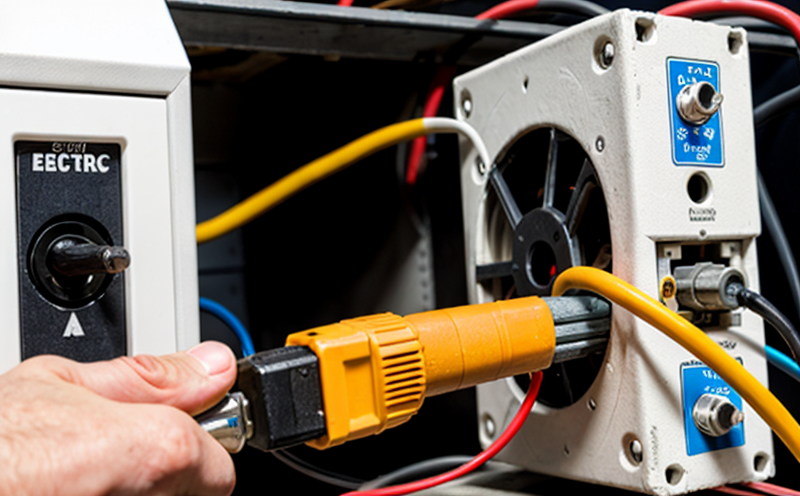IEC 61000-4-30 Power Quality Measurement
The IEC 61000-4-30 standard is a crucial part of the International Electrotechnical Commission's (IEC) suite of standards for electromagnetic compatibility (EMC). It specifically addresses power quality measurements, which are essential in ensuring that electrical systems and equipment function correctly within their intended environment. This service encompasses the testing procedures outlined in IEC 61000-4-30 to assess the compliance of HVAC equipment with these stringent requirements.
Power quality is a measure of how well electricity meets specified standards of voltage, frequency, current, and wave shape. Poor power quality can lead to operational inefficiencies, increased maintenance costs, shortened lifespans of electrical components, and even system failures in HVAC equipment. By adhering to IEC 61000-4-30, manufacturers ensure that their products meet the highest industry standards for reliability and performance.
The testing process involves several steps, starting with the identification of relevant parameters such as voltage imbalance, harmonics, flicker, and voltage variations. Each parameter has specific limits set by IEC 61000-4-30 that must be met to ensure compliance. The test setup includes specialized equipment capable of accurately measuring these parameters over a defined period.
Once the measurements are taken, they are analyzed to determine whether the HVAC equipment complies with the standard. This analysis may reveal areas where improvements can be made or where additional testing is necessary. Reporting of results follows strict guidelines laid out in the standard, ensuring transparency and consistency across different laboratories worldwide.
The importance of IEC 61000-4-30 cannot be overstated, especially for HVAC equipment used in critical applications such as data centers, hospitals, and large commercial buildings. Non-compliance can result in costly downtime, safety hazards, and potential legal issues. By incorporating this testing into the manufacturing process, companies demonstrate their commitment to quality and reliability.
To illustrate the significance of power quality measurement, consider a scenario where an HVAC system is installed in a facility that experiences frequent voltage fluctuations. Without proper measurement and correction, these fluctuations could lead to equipment failure or reduced efficiency. By adhering to IEC 61000-4-30, this potential issue can be identified early on, allowing for corrective action before deployment.
The benefits of compliant power quality measurement extend beyond mere compliance; they include enhanced product reliability, improved customer satisfaction, and a competitive edge in the market. Companies that invest in robust testing procedures not only meet regulatory requirements but also build trust with their clients and partners.
Benefits
- Enhanced Equipment Reliability: Ensures HVAC systems operate efficiently under varying power conditions.
- Improved Customer Satisfaction: Delivers reliable performance, reducing the risk of unexpected failures.
- Compliance with International Standards: Meets IEC 61000-4-30 requirements for electrical safety and EMC testing.
- Competitive Edge: Establishes a reputation for quality and reliability, attracting more business opportunities.
| Parameter | Compliance Requirement | Test Methodology |
|---|---|---|
| Voltage Imbalance | < 5% for three-phase systems | Measurements taken over a specified time period using specific instruments. |
| Harmonics | Meets IEEE 519-2014 standards | Analysis of waveform distortion using Fourier analysis techniques. |
Eurolab Advantages
At Eurolab, we pride ourselves on offering comprehensive testing services that go beyond mere compliance. Our expertise in IEC 61000-4-30 power quality measurement ensures accuracy and reliability, backed by years of experience and state-of-the-art equipment.
- Accurate Measurements: Utilize high-precision instruments to ensure accurate data collection.
- Comprehensive Reporting: Provide detailed reports that meet international standards for easy interpretation.
- Expertise in Sector: Our team of engineers and technicians has extensive experience in HVAC equipment testing.
- State-of-the-Art Facilities: Equipped with the latest technology to perform thorough tests under controlled conditions.
We understand the importance of timely delivery and strive to accommodate all clients' schedules. Our commitment to quality and reliability is reflected not only in our testing processes but also in our customer service, ensuring that you receive prompt attention whenever needed.
Use Cases and Application Examples
| Application | Description |
|---|---|
| Data Centers | Ensures uninterrupted operation by maintaining stable power conditions. |
| Hospitals | Guarantees critical systems continue to operate during fluctuations or outages. |
| Commercial Buildings | Achieves energy efficiency and reduces operational costs through optimized HVAC performance. |
- Data Center: By ensuring stable power conditions, IEC 61000-4-30 testing helps prevent costly downtime.
- Hospital: Critical systems must remain operational at all times; this service ensures compliance with stringent standards.
- Commercial Building: Achieving energy efficiency and reducing costs is paramount, especially in large facilities where HVAC systems play a significant role.





